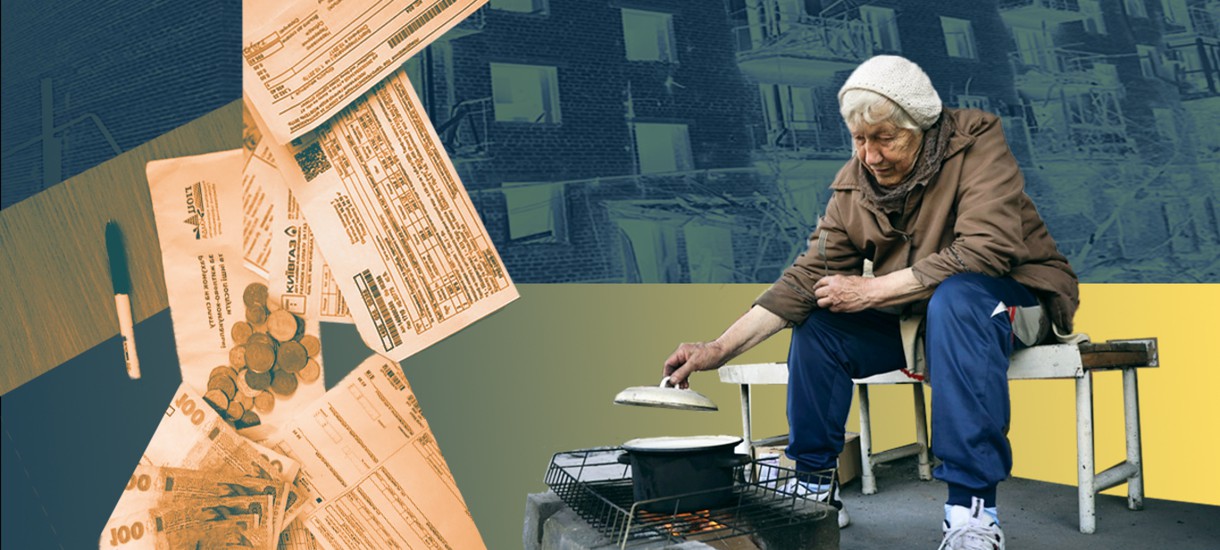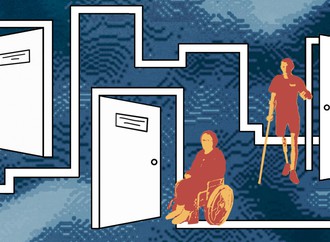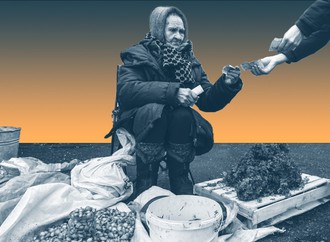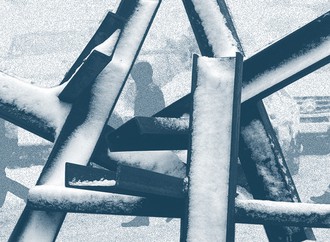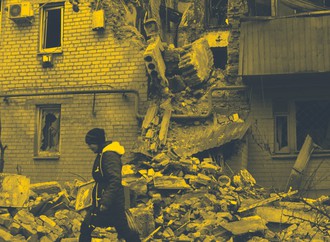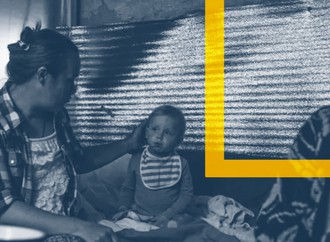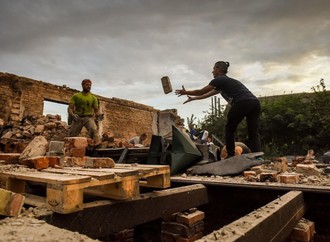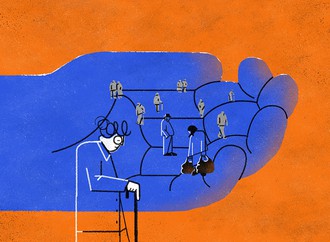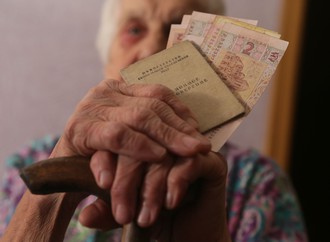Life has always been difficult for elderly people in Ukraine. However, since the war started, the situation has become even worse, especially with the drastic rise of prices and inflation. Moreover, people are not concerned as much about rising expenses than the risk of losing those modest payments and subsidies they currently receive. Without doubt, state social payments are secure and the state takes measures to pay salaries, pensions and social assistance on time. However, every month it is becoming more and more difficult to do so.
The reality
The financial situation in Ukraine is continually getting worse. According to data by the Ministry of Finance, the income of the state budget general fund decreased to 156 billion UAH (3.9 billion EUR) in September, whereas it was 30% higher in August, and 8% more in July. The international aid also arrives later than it should. As reported by the head of the Ministry of Finance, Serhii Marchenko, Ukraine received 4.7 billion USDin August and 2 billion USD in September. At the same time, The Wall Street Journal reports that tax revenues in Ukraine provide only 40% of government spending, most of which goes to defense.
Apart from that, the country lacks gas as it already had before. The board chair of Naftogaz of Ukraine, Yurii Vitrenko, claimed on Facebook that we will have to import gas at the price of 100 UAH per cubic metre (2.5 EUR per cubic metre), whereas heating companies sell gas to people at the price of 7.4 UAH per cubic metre (0.2 EUR per cubic metre). Added to this is regular shelling of Ukraine’s energy infrastructure, which is of vital importance for the country and needs a tremendous amount of funds for fixing anddefense.
Thus, the government was already in a critical situation just prior to the heating season. We do not know for certain that there will be enough funds in the budget for social expenses under such circumstances. This risks resulting in a social default as the government is not able to fulfill its social obligations.
However, the economists we have interviewed do not believe in such a pessimistic scenario and claim that the government will definitely find funds for social payments. Meanwhile, in a commentary for Commons, economist and financial analyst, Oleksii Kushch, brought attention to the problem of pension indexing, as it is not clear now if the process will happen on time and correspond to the inflation rate.
What if we assume the worst possible scenario? An Honoured Economist of Ukraine, Oleksii Plotnikov, told our edition:
“In that case, all the social payments will be suspended. There will be debts on pensions and salaries. Otherwise, the government turns to strict emission and everything will depreciate as it did in 1992-3 [as the story goes with hyperinflation — ed.]. We can only hope that social payments will not be suspended.”
Doubtful support
Meanwhile, living standards continue to worsen for most Ukrainians. The average salary has barely changed, and it continues to decrease in a number of industries. Unemployment is increasing. If able-bodied citizens are experiencing a difficult time, how can pensioners manage if they spend much of their savings on medicine, which has risen almost three times in price? The average pension in Ukraine is 4,500 UAH (112.50 EUR), and out of 10.7 million citizens, who are entitled to these payments, 4.5 million receive pensions that are 2-3000 (50-70 EUR).
Additionally, many elderly have to spend a significant portion of their pension on utility bills, as the subsidy does not fully cover them. A lonely 70-year-old Kyiv resident with a disability, Rosaliya Kukylko, a disabled person of the second category, told our journalists that with a subsidy, she had to pay an extra 150 UAH (3.75 EUR) for utility bills last year , and an extra 700 UAH (17.5 EUR) this year. This is considering the pension in the amount of 2,700 UAH (67.5 EUR). Mariya, a 65-year-old resident of Zakarpatiian village of Solotvyno, had to go into debt to buy firewood for the winter for 13,000 thousand UAHs (325 EUR), whereas the subsidy only compensates for 5,000 UAH (125 EUR). Mariia’s story became the basis for the petition to the president of Ukraine. Her case is just one of many.
Ukrainians in temporarily-occupied territories of the Zaporizhzhia region report that they haven’t received their pensions since spring. This story was told by a local resident, 38-year-old Oleksandra (the name has been changed):
“My mother hasn’t received her pension for four months already. We had to take two Russian pensions in the amount of ten thousand rubles each (134 EUR). We bought some food, petrol, gas, medicine. Maybe, we shouldn’t have done it, but we didn’t really have another option. Otherwise, we would have stayed without money. We live in the countryside; I don’t earn anything because my business is on hold. At the same time, Ukraine isn’t paying pensions. We even got a bank card at PrivatBank a month ago, but its balance is still zero.”
Oleksandra’s, and many other similar stories demonstrate that most Ukrainians face social problems that remain unresolved by the state. That is why many citizens have no illusions about social assistance in case the situation gets dramatically worse.
Projects and plans
The social politics itself in Ukraine spurs justified uproar due to systematic reduction in social welfare funding. The graphic below shows the dynamics of social payments from 2017 to 2021.
It is worth mentioning the pension reform which was introduced in 2011. It resulted in increasing the retirement age for women from 55 to 60. The insurance period both for men and women has been increased. It will now be 29 years and will increase to 35 in 2028. Meanwhile, as the head of Ptoukha Institute for Demography and Social Studies, Ella Libanova, states, life expectancy has barely changed in 30 years.
As we can see, there have been tremendous social problems for years and they have been partially caused by senseless actions of neoliberal reforms. The result in war conditions may be a complete systemic collapse. .
The new “cumulative system,” or so-called “second-level” of pension provision, has also drawn condemnation. Under this system, citizens’ incomes are burdened with an extra cost – mandatory monthly insurance fees of up to 7%. At the same time, it proposes investing insurance premiums in a few possible ways, mainly in Ukrainian government loan bonds and the mortgage market. Therefore, the government will solve its problems thanks to additional fees on citizens’ incomes. This money will be invested in sectors which lack financing and are speculative.
However, the main danger lies in the ideological change in pension provisioning. It is suggested that we treat pensions not as a public domain, but as the result of successful investments which, moreover, are under constant threat of “burning” in Ukraine. Therefore, a person will have no retirement savings or pension. Let us add that in the1990s accumulated pensions were introduced in Central and East European countries, which did not lead to the expected results and did not provide the population with decent payments.
As for the current solidary pension system, it is in deep crisis because the Ukrainian Pension Fund’s own income does not cover the costs of paying pensions. It is worth noting though, that the government seek funds from other sources as well. Article 46 of the Ukrainian Constitution states the citizen’s right for social protection and provision in case of complete, partial or temporary disability. This right is guaranteed by mandatory state social security thanks to insurance payments of citizens, enterprises, establishments and organizations, as well as budgetary and other sources of social welfare; including networks of public, community and private institutions for the care of the disabled.
The Ministry of Social Policy of Ukraine is promoting a number of goals which raise many questions. Plans for the years 2021-2022 emphasized the revision of financial assistance distribution to various social groups, which, according to Ministry officials, does not encourage people to look for a job. Due to so-called “consumer attitude” of low-income families towards state aid, its costs are increasing every year.
The current head of the Ministry of Social Policy, Oksana Zholnovych, initiated the idea of massive involvement of non-governmental organizations to provide pensioners and low-income citizens with social assistance, which would compete with state organizations. As a result, a situation emerges where the state is systematically withdrawing from the social sector, replacing it with business and non-governmental organizations.
However, there are innovative projects which deserve our attention. One is a basic income for every elderly Ukrainian in addition to pension contributions. It was proposed by an ex-head of the Ministry of Social Policy, Maryna Lezebna, shortly before her resignation in July. The question lies in its realization. The economists believe it is possible to bring the idea to life if the government can freely use its budget. Meanwhile, Ukraine is continuing to take new debts and can hardly pay the old ones.
How to survive?
What do average Ukrainian pensioners think of their future? In the early stages of the war, a few elderly people in personal conversations with our journalists admitted they were preparing for possible delayed pensions and a rise in prices. However, everyone has different possibilities. 72-year-old Iryna and 66-year-old Andriy Bondarenko live in one of the villages in Kalynivskyy district of the Vinnytsia region. Together, they receive a pension of 4,700UAH (117.50 EUR). Neither of them works. Necessary monthly costs for the household include: electricity, milk, bread and eggs for which they spend about 2,000 UAH. Andrii explained:
“For the last few years, we have made a stock of cereal, flour, and sunflower oil. We have made our own canned food. There’s a supply of firewood, as well. If prices rise suddenly, then we can do without milk and eggs somehow. We’ll only buy bread and pay for electricity bills.”
Andrii also mentioned that even under the worst scenario, a pensioner in the countryside can keep afloat thanks to garden harvests.
The situation is far worse for pensioners living in big cities. Rosaliya Kukylko tells us that she can not afford fruits or vegetables. Last year, the vendors in the market in Kyiv gave her spoiled food for free, but today they try to sell it. Rosaliya Ivanivna says her relatives, who send her vegetables and canned food from the countryside, are helping her a lot. The pensioner hasn’t received any humanitarian aid from volunteers or international organizations since early summer. Neither does Rosaliia receive aid from the public administrative service centre because, as she explains, only displaced people or people with disabilities of the first group are entitled to receive it. Rosaliya Ivanivna is confident that if the prices for products rise or the pensions are delayed, she and other city pensioners won’t be able to survive.
Helping Hand
A significant increase in pension rates would improve the financial situations of pensioners. Though, under present circumstances, it seems impossible. Economist Oleksiy Kushch believes the government should reconsider its approaches to solving the social problem, particularly its philosophy of taxes as primary concern and government spending, secondary, should be in reverse:
“There is a global practice: primary government spending first, and then taxes come. That is, the government initially spends money and then returns it back through stimulating economics in the form of taxes. That’s how the model of the circular economy works.”
Kushch suggests using a targeted approach in social policy: paying extra pensions once a quarter to all those who receive average and below-average pensions. He believes the necessary funds for payments can come from emission sources of the National Bank:
“On the one hand, it could support the citizens, on the other hand — they could buy more social goods and services offered by small and medium-sized enterprises. This concerns other socially-vulnerable citizens as well.” Kushch also thinks it is important to revise the various statuses of social benefits and make them more flexible. Internally-displaced people should receive an aid programme. The citizens who live in war zones would have access to a different one. The flexibility should concern all social groups without cutting any existing programmes.
Some sociologists emphasize providing pensioners with work. There is a great number of pensioners who are ready to work, but there is a lack of job vacancies. In this case, the government should initiate different programmes, including with business, to create more employment opportunities.
Most importantly, such initiatives should take a systematic approach – this is key. The government in particular, should develop and finance activities which would support all the social groups in different aspects. However, in Ukraine, this process is downloaded to local authorities which usually do not have enough funds for it. Further, some local administrations do not know how to systematically help vulnerable population, or they do not prioritize it. Though on the local level, it is possible to quickly identify disabled people who are in critical financial situations and need care or other kind of help. There are positive examples of this.
A 29-year-old head of Novodmytrivska United Territorial Community in Cherkasy region, Artem Kukharenko, believes that the elderly people in addition to their financial need, also lack attention. As he explained, in all 17 villages of the Community, with a population of 11,000, the local authorities take the initiative to help each pensioner to receive a subsidy without waiting for applications . Also, Kukharenko demands that his co-workers from social services constantly report on the people who need social aid. However, any citizen can do this themselves, as Kukharenko’s phone number and phone numbers of all his assistants and mayors are available on the Community website. Kukharenko, who was the youngest to become the head of a village council at the age of 23, believes the communication between authorities and local people plays an important role in life ofthe Territorial Community. It allows citizens to access help quickly (on the condition that there are enough funds in the budget). Kukharenko told us:
“In every town or village there are people responsible for providing social support to pensioners. We don’t forget to congratulate elderly women and men on their birthdays. Those who have jubilee receive presents from us. Also, in cultural buildings we arrange events for the elderly, listen to their problems, teach them how to use a smartphone and how to pay utility bills, and so on.”
As for financial assistance, the Novodmytrivska Community takes a facilitative role. A lot of the elderly, Kukharenko says, have land which they rent out to local farmers and agricultural holdings. If an elderly man or woman urgently needs money for medicine, the administration of the village or town asks the business to pay the whole amount of rent to the landlord early. Though it is not stated in the contract, the business usually cooperates.
With a population of 30,000 in the town of Chortkiv in the Ternopil region, local authorities provide a one-time financial payment in the amount of 1-5,000 UAH (25-125 EUR) from the mayor’s fund to pensioners who are in critical life circumstances. There are also programmes for medical treatment of cataracts and other diseases. We were told this by a town mayor, 36-year-old Volodymyr Shmatko:
“There are programmes. Everything depends on the communication and the information made available to the local authorities. We know about lonely elderly people, but there are also those who have to survive though they never ask for help.”
Shmatko is confident that social protections should be provided at an appropriate level in every territorial community. Though every mayor is aware of and understands their own local situations and needs: “Some heads believe money should be spent on construction of new roads and sidewalks. Some — on parks and stadiums. I’m confident there should be a proportionally equal approach to all key problems of the community and social groups. There are educational, cultural, infrastructural and social defense needs. The communities have the right to take any decisions specified by law. There should only be demands, opportunities and feedback.”
Finally, I would like to emphasize that the situation in Ukraine is complex,with a high probability of humanitarian disaster, and even in regions where there is no military conflict. Central and local authorities should take all possible measures to avoid crisis and support citizens, and elderly Ukrainians in particular. We must keep in mind that they are who created the country: cared for it, taught it and built it. That is why they have the right to count on support. The support should not be an initiative coming from separate administrative units, but it should be systematic and in solidarity.
